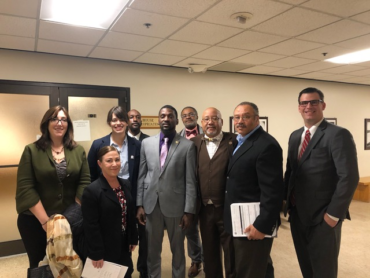When Bruce Franks, a Ferguson organizer turned Missouri state representative, was sworn into office, one of his first objectives was to tackle the state’s unjust criminal justice system. The result? House Bill 508 (HB508), a bill that if passed, would restore voting rights to people with felony convictions upon their release from prison. Currently, 60,000 Missourians who are on probation or parole cannot vote. This bill would reverse this historic disenfranchisement that disproportionately affects communities of color.
Along with our partners and formerly incarcerated individuals, Advancement Project’s Power & Democracy Director, Denise Lieberman, testified in support of the bill at the Missouri state capitol this past week.

Read a portion of Denise’s testimony below.
“Missouri’s citizens, workers and taxpayers are entitled to a voice and deserve a say in their destinies. This measure promotes public safety, honors the Missouri Constitution’s affirmative right to vote for all our state’s citizens, and is in keeping with legislative trends around the country.
Leading into the 2018 elections, more than 6 million people were ineligible to vote due to a felony conviction. The vast majority – 77 percent or some 4.7 million – are not incarcerated but live in one of the 34-plus states that prohibit voting by people on probation parole or who have completed their sentences. These individuals live in our communities, attend our churches, send their children to our local schools. They work and pay taxes. They should have a voice in the matters that impact their communities and their lives. African Americans are disproprotionately represented; one in 13 African Americans is disenfranchised due to one of these laws, compared to one in 56 white voters.
The collateral consequences are significant. For example, Advancement Project’s recent report, Democracy Disappeared: How Florida Silences the Black Vote through Felony Disenfranchisement, details the impact felony disenfranchisement has on Black communities in Florida.3 Hit hard by mass incarceration, the report shows how Florida’s Black communities have suffered because large segments of the population can’t vote. This neighborhood-level analysis shows that Florida’s formerly incarcerated residents overwhelmingly return to Black neighborhoods that have disparate levels of income, employment, education and child poverty compared to the rest of the state. Florida is not alone. Laws that continue to deprive the vote to people after they have been released from prison do not advance any government interest. Studies show that they do not deter crime or advance the integrity of the elections. In fact, all significant evidence supports the opposite – probationer and parolee voting advances compelling state interests, reduces recidivism and supports the rehabilitative goals of probation and parole.4
In Missouri, some 60,000 individuals are on probation or parole and unable to vote. The Missouri Constitution “establish[es] with unmistakable clarity that the right to vote is fundamental to Missouricitizens.”5 HB 508 would help make that promise a reality for tens of thousands of Missouri citizens who are currently living in our communities but have no voice in its governance. Accordingly, I urge you to vote YES on H.B. 508.
3 Advancement Project, Democracy Disappeared: How Florida Silences the Black Vote through Felony
Disenfranchisement, available at: https://advancementproject.org/democracydisappeared/
4 See, e.g., Guy Padraic Hamilton-Smith and Matt Vogel, The Violence of Voicelessness: The Impact of Felony Disenfranchisement on Recidivism, 22 La Raza L.J. (2015); Alec C. Ewald, “Civil Death:” The Ideological Paradox of Criminal Disenfranchisement Law in the United States, 2002 Wis. L. Rev. 1045, 1114-15 (2002) (“[D]isenfranchising released prisoners says that we do not believe our ‘correctional’ institutions have successfully prepared them to re-enter society, and barring those on probation and parole from voting runs counter to the rehabilitative assumptions behind these penalties.”)
5 Weinschenk v. State, 203 S.W.3d 201 (Mo. 2006)